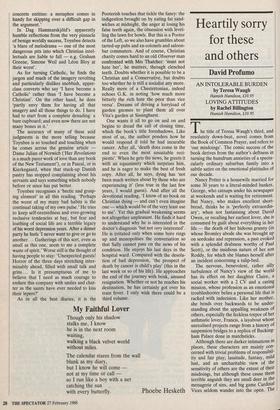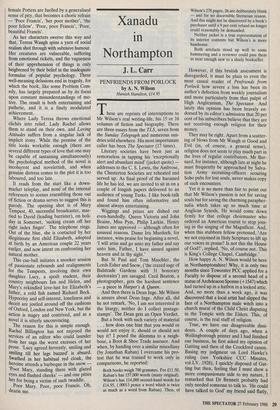Heartily sorry for these and others
David Profumo
AN INTOLERABLE BURDEN by Teresa Waugh
Hamish Hamilton, £1 0.95
LOVING ATTITUDES by Rachel Billington
Hamish Hamilton, £10.95
The title of Teresa Waugh's third, and resolutely down-beat, novel comes from the Book of Common Prayer, and refers to `our misdoings'. The comic success of the book derives from the author's deftness in turning the humdrum anxieties of a specta- cularly ordinary suburban family into a subtle satire on the emotional platitudes of our decade.
Nancy Potter is a housewife married for some 30 years to a literal-minded banker, George, who catnaps under his newspaper at weekends and is waiting for retirement. But Nancy, who makes excellent short- bread, thinks he is 'perfectly extraordin- ary'; when not fantasising about David Owen, or recalling her earliest lover, she is consumed by guilt about everything in her life — the death of her hideous granny (in whose Bromley abode she was brought up on seedcake and repression, a past evoked with a splendid drabness worthy of Paul Scott), or the insidious nature of her son Roddy, for which she blames herself after an incident concerning a tulip-bed.
The nervous, benevolent, rather silly turbulence of Nancy's view of the world has its effect on her daughter Claire, a social worker with a 2 CV and a caring mission, whose profession as an emotional troubleshooter belies a personal life that is racked with indecision. Like her mother, she bends over backwards to be under- standing about the appalling weakness of others, especially the feckless torpor of her asthmatic lover, Francis, a layabout whose unrealised projects range from a history of suspension bridges to a replica of Bucking- ham Palace done in matchsticks.
Although there are darker intimations in places, these characters are mainly con- cerned with trivial problems of responsibil- ity and fair play; lassitude, fantasy, mild lust, and an uncharitable view of the sensitivity of others are the extent of their misdoings, but although these cause them terrible anguish they are small deer in the menagerie of sins, and big game Cardinal Vices seldom wander into the open. The female Potters are fuelled by a generalised sense of pity, that becomes a choric refrain — 'Poor Francis', 'her poor mother', 'the poor fellow', 'Poor, poor Francis', 'Poor, beautiful Francis'.
As her characters swerve this way and that, Teresa Waugh spins a yarn of social realism shot through with subrisive humour. Her creatures are vulnerable, suffering from emotional rickets, and the vagueness of their apprehension of things is only heightened by their belief in the inadequate formulae of popular psychology. These well-meaning delusions end in tragedy, for which the book, like some Problem Com- edy, has largely prepared us by its focus upon constant misunderstandings of mo- tive. The result is both entertaining and pathetic, and it is a finely modulated achievement.
Where Lady Teresa throws emotional clichés into relief, Lady Rachel allows them to stand on their own, and Loving Attitudes suffers from a singular lack of implicit irony. While the premise of the title looks workable enough (there are several different types of love that one may be capable of sustaining simultaneously) the psychological method of the novel is incoherent and novelettish, and when genuine distress comes to the plot it is too laboured, and too late.
It reads from the start like a down- market teleplay, and none of the internal references to scenes resembling those out of fiction or drama serves to suggest this is parody. The opening shot is of Mary Tempest, 40, successful broadcaster, mar- ried to David (leading barrister), on holi- day in Somerset, 'sucking cream off her right index finger'. The telephone rings. Out of the blue, she is contacted by her illegitimate first child Elizabeth, adopted at birth by an American couple 22 years earlier, and now intent on confronting her natural mother.
This cue-ball initiates a snooker session of passionate rebounds and realignments for the Tempests, involving their own daughter Lucy, a spoilt student, their country neighbours Ian and Helen, and Mary's rekindled love-lust for Elizabeth's father, a cold fish named Richard Beck. Hypocrisy and self-interest, loneliness and deceit are jostled around off the cushions of Oxford, London and New York, but the action is stagey and contrived, and as a novel it is utterly unconvincing. The reason for this is simple enough. Rachel Billington has not enjoyed the services of an editor who could launder from her saga the worst excesses of her prose. 'Lucy agreed fervently, smiling and smiling till her legs buzzed' is absurd. Swathed in her habitual red cloak, the heroine attends a barbeque in the snow `Poor Mary, standing there with glazed eyes and flushed cheeks' — and one pities her for being a victim of such twaddle. Poor Mary. Poor, poor Francis. Oh, dearie me.



















































 Previous page
Previous page